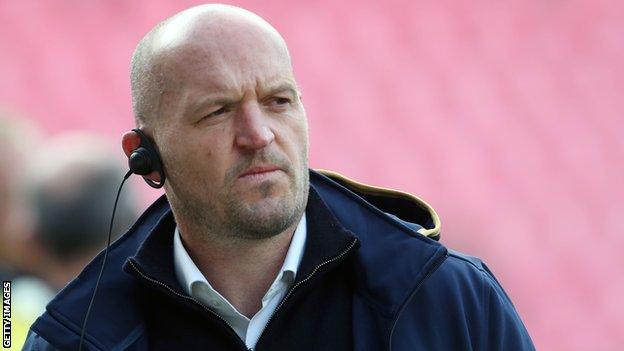Autumn Nations Cup: What is new tournament & why does it matter to Scotland?
- Published

Gregor Townsend leads Scotland into a four-Test autumn programme
Autumn Nations Cup: Italy v Scotland |
|---|
Venue: Stadio Artemio Franchi Date: Saturday, 14 November Kick-off: 12:45 GMT |
Coverage: Live commentary on BBC Radio Scotland, live text commentary on BBC Sport website & app |
An exciting menu of Test-match rugby, or a commercially driven barrage of fan-free games?
The inaugural Autumn Nations Cup begins for Scotland on Saturday, the tournament conceived after Covid-19 decimated rugby's scheduled international programme.
Scotland start their campaign with a trip to Italy on Saturday, before hosting France and Fiji on successive weekends.
But what is this new tournament, how does it work, and why does it matter to Gregor Townsend and his team?
What's the format?
It's pretty straightforward, really. There are two pools of four teams. In Group A sit England, Wales, Ireland and Georgia, while Group B comprises Scotland, France, Fiji and Italy.
Each side plays every opponent in their pool once. Then, depending on the final standings, each team plays the corresponding side from the other pool.
The top team in Group A plays the top team in Group B to determine the winner, second plays second, third plays third and... well, you get the gist.
Why has it been launched?
Typically, southern hemisphere nations travel north to play internationals in Europe during November, but that has not been possible this year.
An alternative was needed to deliver competitive matches and vital income.
Right now, rugby needs money more than ever. Budgets are being slashed, redundancies are occurring, and pay cuts have been negotiated at clubs and unions in virtually every top nation.
Scottish Rugby chief executive Mark Dodson anticipates losses of £30m with fans unable to attend any of their autumn fixtures.
Although there will be no supporters at Murrayfield, the broadcast income could provide a financial shot in the arm, with Amazon Prime buying UK rights to show the bulk of the matches.
What about the actual rugby?
The money, of course, is hugely important, but on the field, these games are precious opportunities for players and coaches.
Scotland's summer tour of South Africa and New Zealand was cancelled, so having blood-and-thunder matches against formidable opposition is a necessity.
The tournament also gives Townsend vital time in camp with his men, time that he can use to implement ideas and build cohesion, and time for the players to form deeper bonds with one another.

Townsend can further develop his game plan, aiming to strike a balance between the high-tempo but try-leaking abandon of 2019 and the steely snarl that ground Scotland to three Six Nations wins and the best defence in the tournament this year.
The coach can test combinations, bleed in newly-eligible players such as Oli Kebble, Duhan van der Merwe and Jaco van der Walt, and build the depth of his player pool.
With front-line fly-halves Finn Russell and Adam Hastings out for the entire autumn, alternatives must be found. Others, especially Glasgow centre Sam Johnson, are returning from injury and will have the chance to force their way back into the side.
And the world rankings?
Actually, these don't matter too much. Of course, it's satisfying to see your team climb the ladder, but the tangible benefits in this case are small.
World Rugby rankings dictate the seeding for each Rugby World Cup draw, but even though the next global showpiece is not for three more years, that process has already taken place.
In fact, the governing body announced last month that the rankings from January 2020 would determine the seeding bands for 2023 due to the havoc being wreaked to the intended international schedule.
After a grim 2019, Scotland wound up in the third band of seeds and could be pitched into a brutal pool in three years' time.
So, while a strong autumn showing will yield plenty, it will not affect Scotland's prospects of a more favourable World Cup draw.